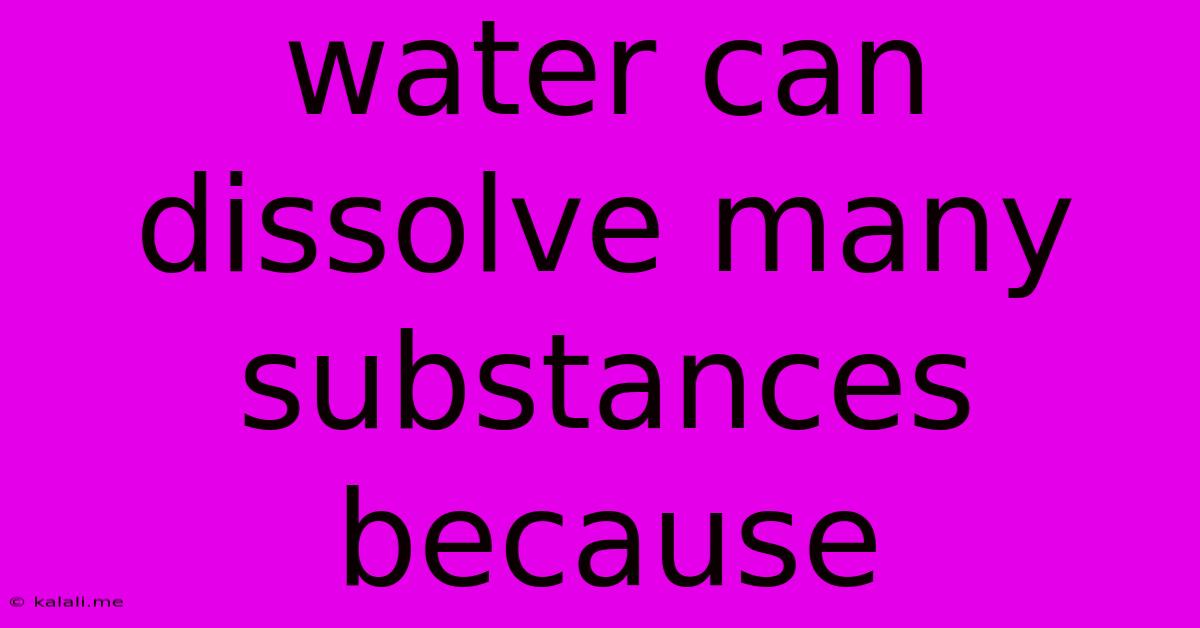Water Can Dissolve Many Substances Because
Kalali
Jun 12, 2025 · 3 min read

Table of Contents
Water: The Universal Solvent – Why It Dissolves So Much
Water's ability to dissolve a vast array of substances is fundamental to life on Earth and numerous industrial processes. This remarkable property, making water a powerful universal solvent, stems from its unique molecular structure and the resulting interactions with other molecules. Understanding why water is such an effective solvent is key to appreciating its crucial role in various fields, from biology to chemistry and beyond.
The Polar Nature of Water Molecules
At the heart of water's solvent power lies its polarity. A water molecule (H₂O) consists of two hydrogen atoms covalently bonded to a single oxygen atom. However, oxygen is significantly more electronegative than hydrogen, meaning it attracts the shared electrons more strongly. This unequal sharing of electrons creates a polar molecule, with a slightly negative charge (δ-) near the oxygen atom and slightly positive charges (δ+) near the hydrogen atoms. This uneven distribution of charge is represented as a dipole.
Hydrogen Bonding: The Key to Dissolution
This polarity allows water molecules to interact strongly with other polar molecules and ions through hydrogen bonds. A hydrogen bond is a relatively weak type of bond that forms between the slightly positive hydrogen atom of one water molecule and the slightly negative oxygen atom of another. These bonds are responsible for many of water's unique properties, including its high boiling point and surface tension. But they are also crucial for its solvent abilities.
When an ionic compound, like salt (NaCl), is added to water, the polar water molecules surround the ions. The slightly negative oxygen atoms attract the positively charged sodium ions (Na⁺), while the slightly positive hydrogen atoms attract the negatively charged chloride ions (Cl⁻). This process, called solvation or hydration, effectively breaks the ionic bonds holding the salt crystal together, causing it to dissolve.
Dissolving Polar Molecules
Water also dissolves many polar molecules. These molecules, like sugar (sucrose), possess regions of partial positive and negative charge due to unequal electron sharing within their structure. The polar water molecules interact with these regions through dipole-dipole interactions and hydrogen bonds, weakening the intermolecular forces holding the polar molecule together and allowing it to dissolve.
Limitations of Water's Solvent Power
While water is an excellent solvent for many substances, it's not a universal solvent in the strictest sense. It does not dissolve nonpolar substances, such as fats and oils, effectively. These substances are composed of molecules with evenly distributed electrons, lacking the positive and negative regions that attract water molecules. Nonpolar molecules are more likely to interact with each other than with water molecules, leading to poor solubility.
Conclusion: Water's Importance as a Solvent
Water's ability to dissolve a wide range of substances is a consequence of its polar nature and its capacity to form hydrogen bonds. This property makes water essential for various biological processes, such as transporting nutrients and removing waste products in living organisms. In industry, water is used as a solvent in countless applications, from cleaning and manufacturing to chemical reactions. Understanding the fundamental reasons behind water's solvency is crucial for appreciating its importance in both the natural world and human society. Further exploration into the intricacies of solvation and the various factors affecting solubility can unveil even more fascinating aspects of this remarkable molecule.
Latest Posts
Latest Posts
-
2 Sample T Test Or Z Test
Jun 13, 2025
-
Which Sea Separates Europe From Africa
Jun 13, 2025
-
Which Of The Following Is True About A Firewall
Jun 13, 2025
-
Difference Between Animal And Plant Mitosis
Jun 13, 2025
-
What Is The Multiples Of 13
Jun 13, 2025
Related Post
Thank you for visiting our website which covers about Water Can Dissolve Many Substances Because . We hope the information provided has been useful to you. Feel free to contact us if you have any questions or need further assistance. See you next time and don't miss to bookmark.